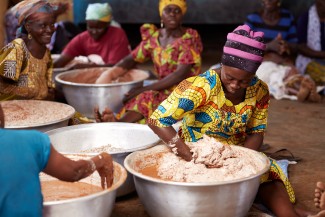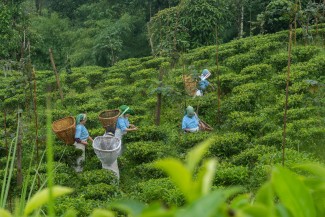Public-private partnership to boost incomes in shea.
Togo’s shea industry, though on an upward growth trajectory, could still use a boost.
A 2017 study by LMC International for the Global Shea Alliance (GSA) ranks Togo as the 7th largest shea producing country, with 5% of the West African shea export market. Annually, the Togolese shea sector produces between 20,000 to 25,000 tons of kernels per year. However, stakeholders believe this could be scaled up considerably.
One of those stakeholders is the Lomé-based Nouvelle Industrie des Oleagineux du Togo (NIOTO), a private sector agro-industrial business that produces butter from shea kernels. NIOTO has partnered with the local NGO Action et Gestion des Insuffisances et Initiatives Rurale (AGIR), which focuses on sustainable development, to implement specific shea-related activities in relevant regions across Togo. The partnership will build five warehouses and strengthen the business knowledge of 4,000 women, with the expectation that those women will then be able to produce and sell 5,000 tons of shea kernels per year.
Women collectors and processors in the shea value chain in countries like Togo, and also Benin, Burkina Faso and Mali, are a focus because of their integral role in shea production.
Etienne Kombate, Commercial and Logistics Director at NIOTO, said, “Women are playing a major role in this sector, and are considered to be the main anchor of the shea supply chain, and are involved at each level from the collection, through to the processing and selling of the kernels.”
For private sector entities like NIOTO, the new partnership, established through the Enhanced Integrated Framework-funded PRADCIFK initiative, removes levels of complexities in their supply chain, driving more traceability and transparency because it creates a more direct supply chain with fewer intermediaries.
GSA is leading efforts to establish public-private partnerships (PPPs) such as the one between NIOTO and AGIR, which are crucial to driving sustainable growth in the shea industry. This kind of work presents an opportunity to contribute to the strategic organization of a more inclusive and sustainable trade in shea kernels, as the women collectors trained and formed into cooperatives are able to aggregate higher volumes, and secure and manage contracts with NIOTO. The commercial relationship created is expected to increase women’s income by more than 30% over the next two years.
The new partnership will work at strengthening capacities in entrepreneurship and business development alongside setting up critical infrastructure such as storage warehouses – both needed elements to boost the sector.
Tekentou Tchepan, Project Manager for the Enhanced Integrated Framework’s work in Togo, said, “NIOTO is part of a network of transformers including several private firms that are really committed to working hand-in-hand with partners from the non-private sectors to devise innovative solutions to the challenges impacting the Togolese shea sector. We believe we’re already on course to doing this through this project.”
Even though shea has been recognized as a key crop for export diversification, the industry hasn’t achieved this due to limitations with processing and marketing shea at scale.
Kombate said, “This partnership will enable private companies such as NIOTO to get more raw materials and of the highest quality. The NGOs have capability to mobilise women around specific topics in order to build up harvest capacity and quality control in kernels processing.”
The warehouses provided by the NIOTO-AGIR partnership to the women shea collectors will ensure the safe storage and efficient processing of shea kernels. This helps women get higher prices for their kernels, thereby giving more value to the product. It will also facilitate market linkages between these local sellers to international markets to improve sales and revenues – some of the key reasons why PPPs remain crucial for the development of the shea sector.
GSA Executive Committee Women’s Group representative Mamatou Djaffo believes the venture will contribute to growing the shea industry, not only in Togo but in other West African countries.
This collaboration with NIOTO and AGIR mirrors others across all four focus countries of Togo, Benin, Burkina Faso, and Mali with EIF. It reinforces how much importance we place on such partnerships as a critical investment into the shea sector, and reiterates the commitment of stakeholders to the vision of a more sustainable industry.
Mamatou Djaffo
If you would like to reuse any material published here, please let us know by sending an email to EIF Communications: eifcommunications@wto.org.


